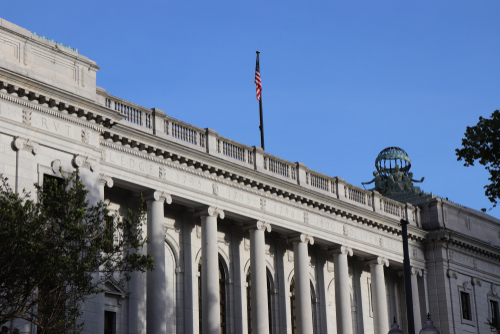
1. Changes to Data Collection for OCC’s Money Laundering Risk System / OCC
On September 8th, 2022, the OCC, as part of its continuing effort to reduce paperwork and respondent burden, invites comment on a revised information collection as required by the Paperwork Reduction Act of 1995 (PRA). The OCC is soliciting comment concerning its information collection entitled, ‘‘Bank Secrecy Act/Money Laundering Risk Assessment,’’ also known as the Money Laundering Risk (MLR) System. The Notice indicates that the OCC is inviting greater scrutiny of customers and transactions involving cryptocurrency, cannabis, and (fiat) currency.
The MLR System is a data collection process, whereby the OCC gathers and analyzes data on an annual basis from the community banks it supervises. This annual survey, known as the Risk Summary Form (“RSF”), gathers information for the MLR System on four major data points of community banks: products, services, customers, and geographies (collectively known as “PSCs”).
For more information: Federal Register / Vol. 87, No. 173
2. The Role of Law Enforcement In Detecting, Investigating, And Prosecuting Criminal Activity Related To Digital Assets / DOJ
On September 16, 2022, the Department of Justice announced significant actions regarding digital assets, including the public release of its report, pursuant to the President’s March 9 Executive Order on Ensuring Responsible Development of Digital Assets, on The Role of Law Enforcement in Detecting, Investigating, and Prosecuting Criminal Activity Related to Digital Assets; and the establishment of the nationwide Digital Asset Coordinator (DAC) Network.
The Report’s listed recommended regulatory and legislative steps, some of them detailed below:
- Expanding the laws prohibiting employees of “financial institutions” from tipping off suspects whose records are sought via grand jury subpoena to apply to virtual asset service providers acting as money services businesses (“MSBs”) under the BSA and expanding the anti-tip off prohibition to include all criminal offenses under Title 18 (the general federal criminal code), Title 21 (the drug laws), and the BSA.
- Amending 18 U.S.C. § 1960, which criminalizes the operation of unlicensed money transmitting businesses, in order to increase its statutory maximum penalty from five years to ten years of imprisonment and doubling its maximum criminal fine from $500,000 to $1 million for certain offenses.
- Issuing regulations or other changes under Section 1960 to provide that peer-to-peer platforms that purportedly do not take custody or assume control over the digital asset being exchanged are MSBs covered by Section 1960(b)(1)(B), which requires MSBs to register with FinCEN.
- Extending the general federal criminal statute of limitations of five years to ten years for offenses involving the transfer of digital assets, “to account for the complexities of digital assets investigations.”
- Statutory or regulatory changes, and international-cooperation initiatives, “designed to address the challenges in gathering evidence of crimes related to digital assets” including laws requiring record preservation or enhanced penalties for non-compliance with legal process.
- Amendments to the venue provision in Title 18, or the venue provisions of specific offenses, “that would permit prosecution in any district where the victim of a digital assets-related offense or other cybercrime is found.”
- Creating criminal and civil forfeiture authority for commodities-related violations, and making such violations predicate offenses, or “specified unlawful activity,” for money laundering charges.
- Lifting the $500,000 cap on administrative forfeitures involving cryptocurrencies (vs. civil or criminal forfeitures, which have no such cap).
- Enhancing the U.S. Sentencing Guidelines applicable to BSA violations, to prevent federal district courts from “viewing BSA offenses as mere technical or regulatory violations not meriting a substantial period of incarceration.”
- Supporting FinCEN in issuing a final rule amending the recordkeeping and Travel Rule regulations under the BSA as they apply to virtual currency transactions.
For more information: Justice Department Announces Report on Digital Assets and Launches Nationwide Network
3. Defendant Pleads Guilty to Bank Secrecy Act Charges Hanan Ofer Facilitated More than $1 Billion in High-Risk Transactions Without Required Anti-Money Laundering Compliance Program / DOJ
On September 13, 2022, the DOJ published that Mr. Hanan Ofer pleaded guilty for failing to maintain an effective anti-money laundering program in violation of the Bank Secrecy Act, as part of a scheme to bring lucrative and high-risk international financial business to a small, unsophisticated credit union.
According to court filings, from 2014 to 2016, Ofer operated the New York State Employees Federal Credit Union Services Organization (NYSEFCU-CUSO), a money services business that was required to have an effective anti-money laundering program. Through the NYSEFCU-CUSO and other entities, Ofer participated in a scheme that brought over $1 billion in high-risk transactions, including millions of dollars of bulk cash transactions from a Mexican bank to the New York State Employees Federal Credit Union (NYSEFCU). Ofer was experienced in international banking and trained in anti-money laundering compliance and procedures and represented to the NYSEFCU that he and the NYSEFCU-CUSO would conduct appropriate anti-money laundering oversight as required by the Bank Secrecy Act. Instead, Ofer failed to implement an effective anti-money laundering program at the NYSEFCU-CUSO. This failure caused the NYSEFCU to process high-risk transactions, including from Mexican banks, without appropriate oversight and without ever filing a single Suspicious Activity Report, as required by law.
For more information: Defendant Pleads Guilty to Bank Secrecy Act Charges
4. Buy Now, Pay Later: Market trends and consumer impacts / CFBP
In December 2021, the Consumer Financial Protection Bureau (CFPB) issued market monitoring orders to five lenders to provide data on their BNPL loans. This market report summarizes that data, individual and organizational submissions to the CFPB, and publicly available sources to provide a review of BNPL’s marketplace importance and consumer impacts in the United States.
The report identifies several competitive benefits of BNPL loans over legacy credit products. These benefits are both financial (i.e., no interest and sometimes no late fees) and operational (i.e., ubiquitous, easy to access, simple repayment structure). The report also identifies three categories of potential consumer risks: discrete consumer harms (i.e., a requirement to use autopay for all loan payments), data harvesting (i.e., lenders’ use of consumer data to deploy models, product features, and marketing campaigns to increase the likelihood of incremental sales), and borrower overextension (borne out in discrete short- and long-term risks).
A brief review from the report:
- The BNPL industry is in rapid growth. From 2019 to 2021, the number of BNPL loans originated in the U.S. by the five lenders surveyed grew by 970%, from 16.8 to 180 million, while the dollar volume of those originations (commonly referred to as Gross Merchandise Volume, or GMV) grew by 1,092%, from $2 billion to $24.2 billion;
- The industry mix of BNPL usage is diversifying. Apparel and beauty merchants, who had combined to account for 80.1% of originations in 2019, only accounted for 58.6% in 2021;
- 73% of applicants were approved for credit in 2021, up from 69% in 2020.
- The average individual order value (i.e., average purchase amount financed by a BNPL loan) in 2021 was $135, up from $121 in 2020.
- 10.5% of borrowers were charged at least one late fee in 2021, up from 7.8% in 2020.
- 13.7% of individual loans in 2021 had at least some portion of the order that was returned, up from 12.2% in 2020.
- 3.8% of borrowers had a loan that was charged off in 2021, up from 2.9% in 2020
For more information: Buy Now, Pay Later: Market trends and consumer impacts
5. MAS launches Financial Services Industry Transformation Map 2025 / MAS
On September 15, 2022, the Monetary Authority of Singapore (MAS) launched the Financial Services Industry Transformation Map (ITM) 2025. The ITM 2025 lays out the growth strategies to further develop Singapore as a leading international financial center in Asia – to connect global markets, support Asia’s development, and serve Singapore’s economy.
Two of the main objectives of the ITM:
(1) Enhance Asset Class Strengths
MAS will work with the financial industry to deepen capabilities in asset classes in which Singapore plays a key regional or global role.
- Foreign exchange – Broaden and deepen the electronic foreign exchange (FX) trading ecosystem by anchoring more FX platforms and liquidity takers.
- Insurance – Catalyse insurance risk advisory and alternative risk transfer solutions for Asia, to address pandemic, climate, and cyber risks, and facilitate the participation of capital markets in risk financing.
- Wealth management – Become Asia’s center for philanthropy through building impact monitoring solutions, philanthropy advisory competencies, and innovative philanthropy models.
- Asset management – Enhance the Variable Capital Company regime and other fund structures to cater to broader industry needs.
- Private capital markets – Develop private credit to complement private equity and venture capital funding.
- FinTech – Anchor promising FinTech start-ups in areas like Web 3.0, artificial intelligence, and green FinTech.
(2) Digitalize Financial Infrastructure
MAS will promote the development of digital infrastructure and platforms.
- Bond market infrastructure – Improve end-to-end efficiency in primary bond issuances, listing and settlement processes, and strengthen Singapore’s proposition as a bond issuance and listing venue of choice.
- Funds settlement utility – Develop an industry funds settlement utility to centralise subscription, redemption, record-keeping workflows, and facilitate reconciliation of fund data flows, thereby reducing settlement time and improving efficiency.
- SME trade discovery platform (Business-sans-Borders) – Launch a digital platform to connect small and medium enterprises (SMEs) across growth regions. This facilitates trade discovery and enables easier access to trade financing for participating SMEs.
For more information: MAS launches Financial Services Industry Transformation Map 2025
6. CFTC Charges a Decentralized Autonomous Organization (DAO) for Offering Illegal, Off-Exchange Digital-Asset Trading and Failing to Comply with Bank Secrecy Act
On September 22nd, 2022, the Commodity Futures Trading Commission (CFTC) charged the Ooki decentralized autonomous organization (DAO) with allegation that Ooki, as an unincorporated association, violated federal laws around offering leveraged and margined trading products by refusing to register as a Futures Commission Merchant (FCM) and by not having a know-your-customer (KYC) program.
Furthermore, the CFTC requested to hold the DAO’s voting members individually liable, and in an interesting technological development the CFTC filed for permission to serve the DAO’s members by posting the complaint on Ooki’s website and in a help chat bot
Shortly after this filing, the CFTC noticed a post appeared in the Ooki’s online forum discussing the CFTC’s litigation against the Ooki DAO. The CFTC pointed at this discussion as a demonstration that the motion was legally served and that the Ooki DAO and its members are aware of the CFTC’s action – which claims and method of serving the motion were approved by the federal court.
For more information: CFTC Imposes $250,000 Penalty Against bZeroX, LLC and Its Founders and Charges Successor Ooki DAO for Offering Illegal, Off-Exchange Digital-Asset Trading, Registration Violations, and Failing to Comply with Bank Secrecy Act
This update is provided as general information only and may not be relied upon in any individual case without additional legal advice.












